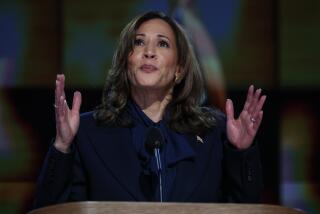Everyone’s Favorite Political Label : Whatever else ‘populism’ means, it doesn’t stand for ‘less government.’
- Share via
Burton Yale Pines, one of the founders of National Empowerment Television, a new cable channel being bankrolled by the conservative Free Congress Foundation, said that while many would call the channel’s politics conservative, he prefers the term “populist.” The channel, he said, would welcome Republicans and Democrats alike who believe in “less government.”
It’s heartwarming that conservatives now feel the need to mask their true ideological identity in euphemisms. In the 1980s, liberals often resorted to euphemisms like “progressive” to avoid being tarred with the L-word, which is still considered politically disadvantageous.
Today, “populist” is the self-label of choice across the political spectrum. But what does the term mean?
Pines is confused if he thinks that there is any connection between “populism” and “less government.” The founding document of American populism--the People’s Party Platform of 1892--called for government ownership of major industries. “We believe that the powers of government--in other words, of the people--should be expanded . . . to the end that oppression, injustice and poverty shall eventually cease in the land.”
The most classically populist item on any major political agenda in recent years was President Clinton’s hefty tax increase on the rich. Second might be Hillary Clinton’s attacks on the pharmaceutical and insurance industries. Yet many of the conservative voices that preen as “populist” oppose these Clinton agendas in classically anti-populist terms. They accuse the Clintons of stirring up “envy,” “divisiveness,” “class hatred” and so on.
In today’s political discourse, “populist” often means nothing more than “popular.” It is a form of democratic bullying--a claim to speak for a majority of the people. As an ideology, this is pretty empty. If all you mean by calling yourself a “populist” is that you believe the will of the majority should carry the day, you are not distinguishing yourself from anyone else in this democracy. If what you mean is that your own particular views are held by the majority, you may or may not be correct. Opposition to NAFTA, for example--regarded in some quarters as the basis for a new populist coalition--never had a majority behind it.
To the extent that “populism” means more than “democracy” itself, it has traditionally been associated with notions of direct majority rule, as opposed to the filters and constraints of constitutional, representative government. But the two procedural items on today’s populist agenda are term limits and the balanced-budget amendment. Both would place new constraints on democratic decision-making.
Today’s popular animus against big government is highly qualified. People are widely opposed to taxes, but they are not opposed to the benefits those taxes pay for. And the “populist” issue du jour is crime, with an agenda of more cops, more prisons, more executions. This is a call for more government, not less.
Today’s populism, like earlier versions, deserves to be treated with both respect and caution. Respect, as it is to some extent a genuine expression of pain by those who are hurting economically. Caution, because like earlier versions, it can curdle into ugly scapegoating of cultural outsiders. But today’s populism also deserves special suspicion of its own, for three reasons.
First, there is a huge phony element. Many of the noisiest purveyors of “populist” anger are themselves chardonnay-sipping elitists. From inside the Beltway, political consultants and commentators fan the flames of rage against “Washington,” and get rich at it.
Second, the audience for today’s aggrieved populist rhetoric is different. In “Voices of Protest,” his book about Father Coughlin and Huey Long, two populists of the 1930s, Alan Brinkley notes that their audience was not the desperately poor, as in the 1890s, but “those on the fringes of the middle class.” Today’s populism has been ratcheted up the social scale once again. Aimed squarely at the heart of the middle class (and led by a billionaire!), it is broad enough to embrace every American short of Donald Trump, and aims its shafts of resentment downward as much as up.
Third, it is especially futile and self-defeating for today’s American middle class to believe that its problems are the fault of someone else. That message may be nice to hear, but it is not the message we need to hear. Those who spread it are doing the country no favor.
More to Read
Get the L.A. Times Politics newsletter
Deeply reported insights into legislation, politics and policy from Sacramento, Washington and beyond. In your inbox twice per week.
You may occasionally receive promotional content from the Los Angeles Times.








